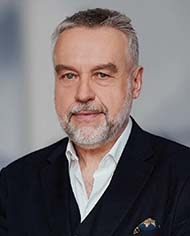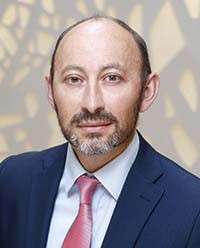 We asked a series of the most prominent figures in the industry for their technology highlights of 2019 and what they would most like to see in 2020.
We asked a series of the most prominent figures in the industry for their technology highlights of 2019 and what they would most like to see in 2020.
JANUSZ LORENC, CHIEF EXECUTIVE, METROSOFT
What was the most important tech/ops event or development in 2019?
The radical drop in the number of appearances of blockchain as a panacea for the problems the fund industry is facing. There is now a wider understanding that technology alone is not the solution. We are seeing initiatives to better understand the fund industry ecosystem and acceptance of the fact that the landscape is changing at an accelerating rate. There has been an emergence of new thinking across operational silos and focused on ecosystem entities’ needs and their contributions to the system. This is significant because it will lead to new ways to design valuable user journeys rather than automating existing processes, and re-engineering organisation processes to embrace the digital service economy. A small number of asset managers have already started abandoning traditional information exchange models, instead focusing on creating data-driven, reactive systems.
 What would you most like to see happen in 2020?
What would you most like to see happen in 2020?
We must focus on digital transformation and the re-engineering of industry processes and the industry as a whole. This requires end-to-end data flows to enable all entities to consume and to provide data when they need to or want to. We must be able to use the same datasets across traditional servicing channels, instead of endlessly replicating and reconciling data. User-centric, data-driven, responsive systems are essential for the future. It is not only what I would like to see happen but rather what must happen – otherwise, sooner or later, the fund industry will be disrupted by big tech companies which drive customer behavior. Investors take the digital service economy for granted, and their digital journeys in other industries form their expectations. The fund industry lags far behind in this aspect.
 LAURENT MAROCHINI, HEAD OF INNOVATION, SOCIETE GENERALE LUXEMBOURG
LAURENT MAROCHINI, HEAD OF INNOVATION, SOCIETE GENERALE LUXEMBOURG
What was the most important tech/ops event or development in 2019?
2019 can definitely be regarded as a critical year regarding the industrialisation of data and artificial intelligence (AI) projects. The maturity of the technology and infrastructure with increasing amounts of data has led to the development of practical and welcome initiatives. Machine learning (ML), natural language processing and AI have had a transformative impact in all segments of the financial industry. They have brought direct benefits to clients by offering them a digital experience combined with new added value services. They have also brought benefits to the bank to better control its risks and operational efficiency.
What would you most like to see happen in 2020?
Harnessing the emerging ecosystem approach to deliver new value propositions in financial services will be at the top of the agenda for 2020. In a world where customers expect digital and environmental, social and governance (ESG) oriented solutions and against the background of open banking and Payment Services Directive 2, we can expect new market players to emerge. The application programming interface (API) economy will be marked by connectivity and the acceleration of innovation. As a result, we expect to see more collaboration between traditional banks, fintechs and pure players to generate value propositions. Collaborative new business models will be the hallmark of 2020.
 OLIVIA VINDEN, DIRECTOR, ALPHA FMC
OLIVIA VINDEN, DIRECTOR, ALPHA FMC
What was the most important tech/ops event or development in 2019?
The most important development in 2019 was the dominance of ‘ecosystem’ news – whether it was the continued growth of BlackRock Aladdin and its acquisition of eFront, the integration of ‘Alpha’, the tie-up between Charles River and State Street, or the adding of products to their stables from the likes of SS&C and FactSet. Ecosystems give asset managers much richer functionality with much lower implementation risk and more joined-up servicing.
What would you most like to see happen in 2020?
I would like to see more commitment to improving the data operating models of asset managers, which requires investment in tech, people, data and business processes. Asset managers should move towards being insight-driven organisations, where data informs decisions and new opportunities arise to grow AuM, generate alpha and reduce costs.
 ROMAIN SAUVAGE, HEAD OF PRODUCT AND MARKETING, AMUNDI
ROMAIN SAUVAGE, HEAD OF PRODUCT AND MARKETING, AMUNDI
What was the most important tech/ops event or development in 2019?
In 2019, the main technology development was around data. All industries recruited data scientists to develop dedicated tools for data centralisation in order to manage data across their entities, geographies and expertise. The second related topic was to open and share the data, while respecting General Data Protection Regulation (GDPR) requirements, and to facilitate exchange internally and externally between partners. Open-source software and APIs were important for industries looking to create new business opportunities.
What would you most like to see happen in 2020?
In 2020, the next step for the industry will be to use data to improve operational processes but also create value-added products for clients. In fact, the automation carried by ML technologies will be increasingly used by the innovation teams in all industries. Understanding how to effectively use data and to improve business process with automation and AI is crucial. Big tech, banks and manufacturers all implement concrete business cases with ML and AI technologies. However, ML needs time to be effective, hence, the results will be really visible in the years to come.
 JON BECKETT, DIRECTOR, ASSOCIATION OF PROFESSIONAL INVESTORS
JON BECKETT, DIRECTOR, ASSOCIATION OF PROFESSIONAL INVESTORS
What was the most important technology development of 2019?
If we think myopically within our industry, notable progress was made in blockchain, open banking and moves to create efficiencies in fund settlement and clearing. However, by far the biggest development was outside of our industry – the use of social media to coalesce ESG issues, be they online voting petitions, voting collaborations, AGM resolutions and protests to campaigns, including the likes of Extinction Rebellion. Given social media’s power to be a force for good (and bad) as well as manipulation, then it is with some optimism that it has brought public pressure to bear on corporations and governments alike to tackle key issues. This new rise of social investing is having a seismic effect already on the fund management industry.
What would you most like to see in 2020?
My hope is that we see greentech solutions to allow the sharing of Task Force Climate-related Disclosures [TCFD] in a similar way we have seen open banking allow APIs to create solutions. In doing so, we can create shared portals for companies to report, asset managers to aggregate and investors to understand the climate impact of their investments. To be a true game-changer, TCFD needs to enable investors to truly understand the impact of the companies they are invested into. Examples already include the Tumelo app and with shared APIs, this can be extended much further from source to customer and further into social and governance issues and broader targets like UN Sustainable Development Goals.
 NASIR ZUBAIRI, CHIEF EXECUTIVE, THE LUXEMBOURG HOUSE OF FINANCIAL TECHNOLOGY
NASIR ZUBAIRI, CHIEF EXECUTIVE, THE LUXEMBOURG HOUSE OF FINANCIAL TECHNOLOGY
What was the most important development of 2019?
The single event that I believe has had the most impact in financial services was the announcement of Libra – the consortium-backed digital currency based on blockchain. It was a wake-up call for the industry and supervisors. It spurred a sudden acceleration in the seriousness with which firms, including those in the fund management and securities value chain, started looking at and even adopting blockchain technology, with a surge in tokenisation of traditional assets. Likewise, Central Bank Digital Currency is now drawing a lot of attention and, with Ms Lagarde now at the helm at the ECB and her positive inclination to blockchain, I would bet we will see the Euro and other currencies being digitalised in the next five to ten years.
What would you most like to see in 2020?
Critically, the industry now really needs to move fast to provide custody and administration of tokenised assets – I am very certain we will see a tokenised sovereign bond issue by Q3 2020, but the infrastructure to support it across the value chain is non-existent. Though blockchain technically removes the need for such functions, as part of a longer-term transition we will need clearing and we will need a robust and trusted secondary market alongside custody. These need to be developed in 2020; firms that get there first will have a competitive advantage – 72% of investors are now seriously considering investing in tokens.
 ADAM BELDING, CHIEF TECHNOLOGY OFFICER, CALASTONE
ADAM BELDING, CHIEF TECHNOLOGY OFFICER, CALASTONE
What was the most important development of 2019?
I think the most interesting thing that happened in 2019 was the apparent achievement of quantum supremacy by Google. Quantum computing potentially offers a huge leap in processing speed for certain types of algorithms. If a general purpose quantum computer becomes available, it could be a revolution in what computers can achieve. However, quantum computing would be a completely new paradigm for the vast majority of people outside of the research world, so how it becomes mainstream and what applications it finds will be very interesting to watch.
What would you most like to see in 2020?
I think 2020 will see consolidation of blockchain and DLT in the enterprise space. I don’t think we have seen a breakthrough application of the technology as of yet but I think we will in 2020, as some of the issues with use of blockchain in enterprise environments are resolved.
 DANIEL ANDEMESKEL, HEAD OF INNOVATION, UNIVERSAL-INVESTMENT
DANIEL ANDEMESKEL, HEAD OF INNOVATION, UNIVERSAL-INVESTMENT
What was the most important technology development of 2019?
AI and ML applications have reached a new maturity level and shown their power of impact. Especially in day-to-day operations for us as a fund service provider, e.g. with regards to enhanced analytics or risk measurement. Additionally, the tipping point for blockchain/DLT has been reached in 2019, with regulators and politicians acknowledging and embracing the technology’s impact. Germany’s government approved digital assets and custody and included them into law, which will come into effect in January 2020. Liechtenstein has already put a dedicated law into effect as well. In the past, the race for the most attractive jurisdiction was silent and now the first movers are untypically visible.
What would you most like to see in 2020?
Blockchain and DLT will expand further and given our ambitions and confidence in the technology for the fund industry, we are looking forward to being one of the first fund administration platforms to launch a regulatory approved digital fund. Through the rise of ESG, we will see more and more efforts to build up alternative data sets to seize on society’s sentiments and to better understand the purpose of investors. Conversational AI will advance further and offer new and improved client experiences besides the first generation of chatbots. Furthermore, we will see an increasing number of combined disruptive technologies, for instance AI/ML and blockchain, which will create new business layers.
 GEOFF HODGE, CHAIRMAN, MILESTONE GROUP
GEOFF HODGE, CHAIRMAN, MILESTONE GROUP
What was the most important technology development of 2019?
Cloud adoption and cloud transformation in the fund services sector. 2019 has seen mainstream acceptance of cloud technologies, with even the most conservative firms now embracing cloud strategies that reduce technology inertia and enable delivery of greater efficiency. The development has opened up a new wave of hybrid operating models and taken outsourcing options to the next level, allowing investment firms to focus on core activities. The accelerated trend to the cloud has assisted firms to achieve more cost-effective infrastructure, enhanced business agility and scalability through simplification. Cost-effective access to the cloud has levelled the playing field for newer and more agile applications to be able to contribute to operational optimisation. With much of the industry focused on the promise of DLT and blockchain technologies, cloud technologies have delivered greater economic value across investment businesses in 2019 in terms of improved operating leverage and efficiency.
What would you most like to see in 2020?
Greater focus across the industry on delivering improved outcomes to the end investor. This necessarily includes operating at industry level on reducing fees/costs for products that deliver superior risk/returns. It also requires improved access to affordable alpha and beta, particularly for low and middle-income investors in relation to retirement savings, by leveraging the buying power of large, established asset pools. While there have been improvements in investor education, innovative product design is likely to make a faster and more material impact on near-term retirement outcomes. Digitalisation is seen as a primary source of opportunity for both enhanced investment outcomes and reduced industry costs that, together, will have a material impact on investor outcomes.
 GERALDINE GIBSON, CHIEF EXECUTIVE, AQMETRICS
GERALDINE GIBSON, CHIEF EXECUTIVE, AQMETRICS
What was the most important technology development of 2019?
Explainable AI-enabled products that monitor, alert, suggest and control workflows when needed was the most important technology development I noticed. The evolution of these smarter products will truly revolutionise customer journeys across a myriad of industries.
What would you most like to see in 2020?
Widely available 5G. With 5G, customer experiences will be turbo-charged.
 BRIAN ODENDAAL, CHIEF OPERATING OFFICER, AMX
BRIAN ODENDAAL, CHIEF OPERATING OFFICER, AMX
What was the most important technology development of 2019?
Following the implementation of GDPR in 2018, consumers entered 2019 with greater awareness of the value of their data, whilst businesses had clearer responsibilities and greater liabilities should they not invest in protecting data as an asset.
Hence 2019 was the year where the focus on cyber security was greater than ever; machine learning, AI and robotics were no longer concepts and played a crucial role in firms advancing capabilities to protect their environments, staying one step ahead of the hacker and predicting attacks. The ability of automated tools to reduce the impact of human error was also greatly enhanced. Alongside this, new regulations accelerated the need to connect user controls to personally identifiable information (PII) e.g. restricted access, MFA, password rules and regular recertification.
What would you most like to see in 2020?
While technology innovation has dramatically changed our workplaces and personal lives, our industry still uses old technologies at its core. I’d like to see a paradigm shift in technology enablement for both clients and employees – connected data integration between business processes and a client’s digital life. Connected apps, acceleration of AI, robotics process automation (RPA) and smart data delivering workflow solutions that alert, control, suggest, trigger and monitor what we need when we need it. As a result, organisations will be able to scale up faster, hone in on insights they missed, understand the ‘why’ behind their data and improve time to action and business impact. At the heart of this is the need for suppliers and providers to work in partnership. Those who can understand and connect within a pluralistic technology ecosystem will prosper and deliver maximum benefit for their clients, but only if they can truly collaborate.
 ROBERT JAMIESON, GROUP CHIEF DIGITAL AND TECHNOLOGY OFFICER, LEGAL & GENERAL
ROBERT JAMIESON, GROUP CHIEF DIGITAL AND TECHNOLOGY OFFICER, LEGAL & GENERAL
What was the most important technology development of 2019?
Whilst many other industries have been disrupted, 2019 was the year where we saw the seeds being sown for disruption of asset management. Nowhere was this more evident than fintech, which came of age in the last year, with just over $3 billion of investments flowing globally into start-ups focusing on asset management. Many of these fintechs are modelling entirely new conceptions of investing, trading, clearing, settlement and custody in search of a means to create a robust infrastructure by creating more effective solutions to address industry-wide pain points. In doing so, they are starting to force a rethink of the asset manager value proposition.
What would you most like to see in 2020?
Around 90% of equity futures trades and 80% of cash-equity trades are executed by algorithms without any human input. The rise of factor investing has meant that AI is also starting to creep outside high-frequency trading into the underlying quant models which are constantly being bombarded with new investible information and actionable insights. However, many algorithms have a ‘black box’ nature or, more generally, AI fails to take off as most companies are still aggregating and enabling their data as a precursor. 2020 may be the year of explainable AI, or at least, where it is starting to live up to its expectations.
 RICHARD CLARKSON, GLOBAL HEAD OF SOLUTIONS, FLEXCUBE INVESTOR SERVICING, ORACLE
RICHARD CLARKSON, GLOBAL HEAD OF SOLUTIONS, FLEXCUBE INVESTOR SERVICING, ORACLE
What was the most important technology development of 2019?
The slow but definite move to Open Transfer Agency with the acceptance and growing usage of APIs. This can propel transfer agency to greater engagement with investors, in particular the millennial investor. As an industry, we have spoken about making sure they have an appetite to save and we can now present ourselves (if we choose to) in a way that entices the next generation to save and invest in their future.
What would you most like to see happen in 2020?
The continuation of acceptance of modern technology as transfer agents develop their product offerings to meet the demands of investors and asset managers. True technology partnerships between providers and asset servicers/asset managers will empower these organisations to be dynamic and provide the real value-add services to investors. This partnership must lead to the extinction of the fax machine from our industry.
© 2020 funds europe